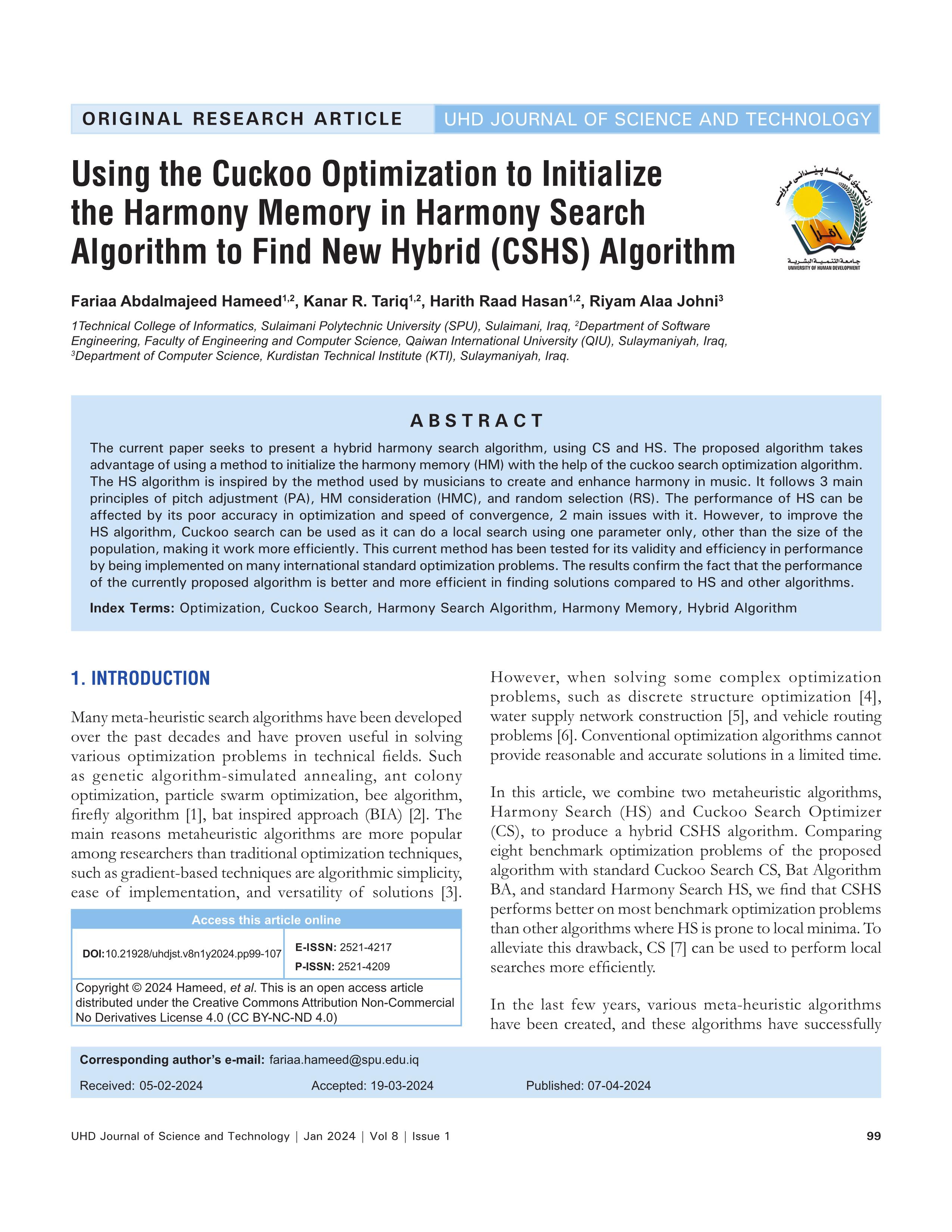Using the Cuckoo Optimization to Initialize the Harmony Memory in Harmony Search Algorithm to Find New Hybrid (CSHS) Algorithm
DOI:
https://doi.org/10.21928/uhdjst.v8n1y2024.pp99-107Keywords:
Optimization, Cuckoo Search, Harmony Search Algorithm, Harmony Memory, Hybrid AlgorithmAbstract
The current paper seeks to present a hybrid harmony search algorithm, using CS and HS. The proposed algorithm takes advantage of using a method to initialize the harmony memory (HM) with the help of the cuckoo search optimization algorithm. The HS algorithm is inspired by the method used by musicians to create and enhance harmony in music. It follows 3 main principles of pitch adjustment (PA), HM consideration (HMC), and random selection (RS). The performance of HS can be affected by its poor accuracy in optimization and speed of convergence, 2 main issues with it. However, to improve the HS algorithm, Cuckoo search can be used as it can do a local search using one parameter only, other than the size of the population, making it work more efficiently. This current method has been tested for its validity and efficiency in performance by being implemented on many international standard optimization problems. The results confirm the fact that the performance of the currently proposed algorithm is better and more efficient in finding solutions compared to HS and other algorithms.
References
X. S. Yang. “Nature-inspired Metaheuristic Algorithms”. Luniver Press, United Kingdom, 2010. Available from: https://books. google.iq/books [Last accessed on 2024 Feb 05].
X. S. Yang. A new metaheuristic bat-inspired algorithm. In: “Nature Inspired Cooperative Strategies for Optimization (NICSO 2010)”. Springer, Berlin, Heidelberg, pp. 65-74, 2010.
X. S. Yang. “Nature-inspired mateheuristic algorithms: Success and new challenges”. Journal of Computer Engineering and Information Technology, vol. 1, pp. 1-3, 2012.
K. S. Lee, Z. W. Geem, S. Lee and K. Bae. “The harmony search heuristic algorithm for discrete structural optimization”. Engineering Optimization, vol. 37, no. 7, pp. 663-684, 2005.
Z. W. Geem. “Optimal cost design of water distribution networks using harmony search”. Engineering Optimization, vol. 38, no. 3, pp. 259-277, 2006.
Z. W. Geem, K. S. Lee and Y. Park. “Application of harmony search to vehicle routing”. American Journal of Applied Sciences, vol. 2, no. 12, pp. 1552-1557, 2005.
R. G. Babukartik and P. Dhavachelvan. “Hybrid algorithm using the advantage of ACO and Cuckoo search for job scheduling”. International Journal of Information Technology Convergence and Services, vol. 2, no. 4, pp. 25-34, 2012.
Z. W. Geem, J. H. Kim and G. V. Loganathan. “A new heuristic optimization algorithm: Harmony search”. Simulation, vol. 76, no. 2, pp. 60-68, 2001.
K. S. Lee and Z. W. Geem. “A new meta-heuristic algorithm for continuous engineering optimization: Harmony search theory and practice”. Computer Methods in Applied Mechanics and Engineering, vol. 194, no. 36, pp. 3902-3933, 2005.
M. Shehab, A. T. Khader and M. A. Al-Betar. “A survey on applications and variants of the cuckoo search algorithm”. Applied Soft Computing, vol. 61, pp. 1041-1059, 2017.
“Evolutionary Programming Made Faster”. IEEE Xplore. Available from: https://ieeexplore.ieee.org/abstract/document/771163 [Last accessed on 2024 Feb 04].
X. S. Yang and S. Deb. “Cuckoo Search Via Lévy Flights”. IEEE Xplore, 2009. Available from: https://ieeexplore.ieee.org/ document/5393690 [Last accessed on 2024 Feb 04].
J. H. Kim and Z. W. Geem. “Harmony Search Algorithm: Proceedings of the 2nd International Conference on Harmony Search Algorithm (ICHSA2015)”. Springer, Berlin, 2015. Available from: https://books.google.iq/books [Last accessed on 2024 Feb 05].
Y. Feng, G. G. Wang and X. Z. Gao. “A novel hybrid Cuckoo search algorithm with global harmony search for 0-1 knapsack problems”. International Journal of Computational Intelligence Systems, vol. 9, no. 6, pp. 1174-1190, 2016.

Downloads
Published
How to Cite
Issue
Section
License
Copyright (c) 2024 Fariaa Abdalmajeed Hameed, Kanar Tariq, Assist. Prof. Dr. Harith Raad Hasan, Riyam Alaa Johni

This work is licensed under a Creative Commons Attribution-NonCommercial-NoDerivatives 4.0 International License.


